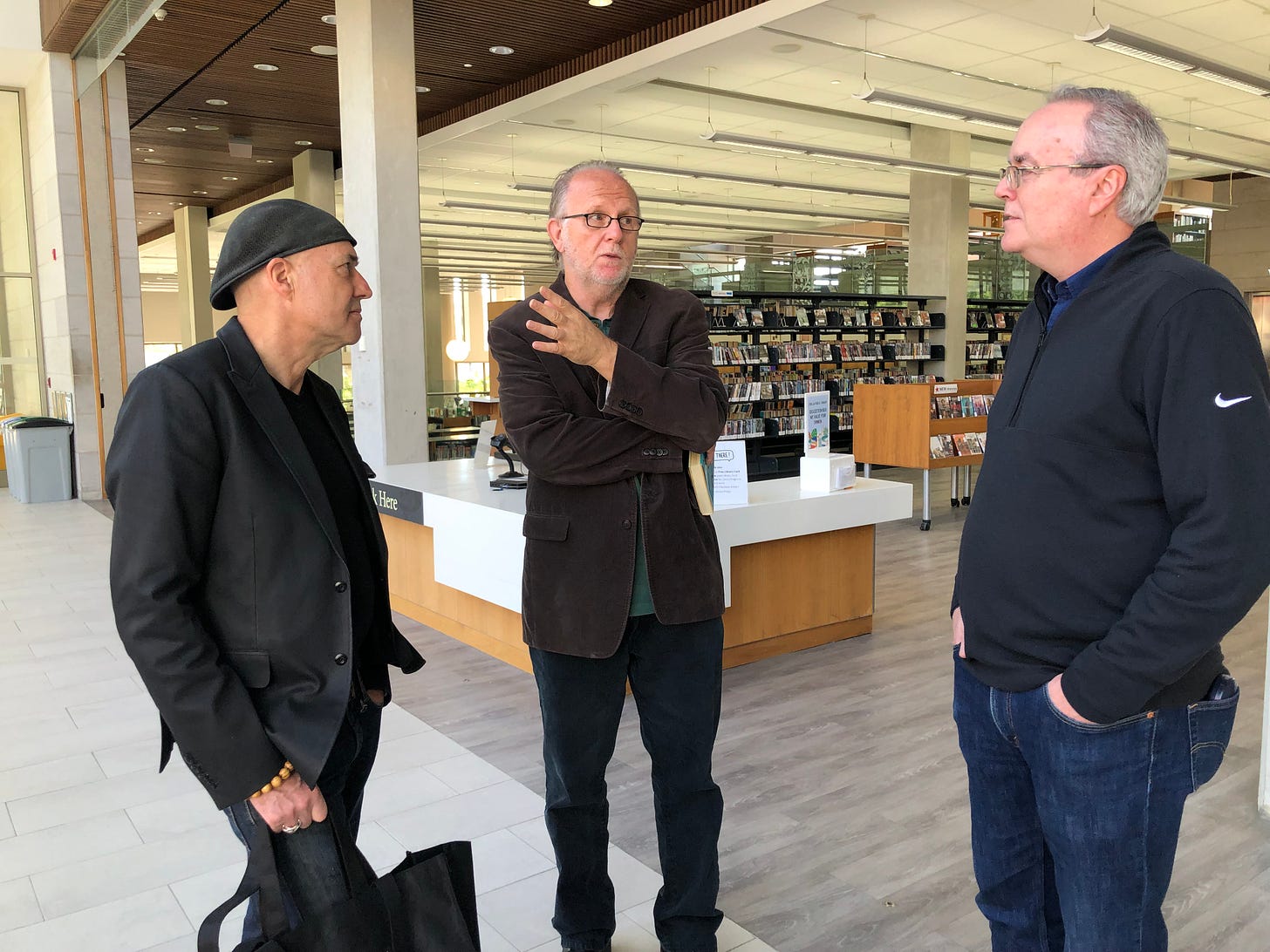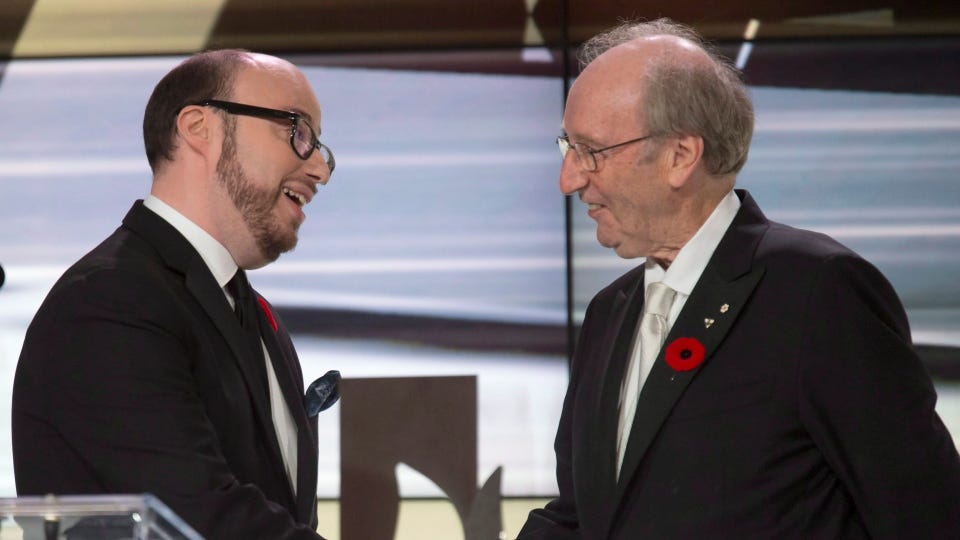Just before we start, I do want to state for the record that I love the writing life—my writing life—in almost every way. So do not mistake this post as a woe-is-me litany of complaints from an unhappy writer. Far from it. Think of it more as a reality check or perhaps a lament. Yet I have never been happier in my life than I’ve been since joining the guild of published writers back in 2007. It’s hard to talk about writers’ incomes, but at some point, I think it’s useful to open up that mysterious black box, take a look at the economics of publishing from the writer’s perspective, and shatter a few myths to which some Canadians might still cling.
I admit I’ve been avoiding this post for a while now. Sometimes you don’t want to see how the sausage is made, or perhaps you don’t care. Understood. On the other hand, I suspect that many readers labour under a false impression of how the publishing industry works and how—or how well—writers are compensated. I don’t really want to point fingers or excavate too deeply the challenges confronting the publishing sector . (There are plenty of more thoughtful analyses available on the causes and culprits, including the big box retailers and the downward pressure they put on book prices—not to mention their negative impact on independent bookstores—among other issues.) But writers do live in a certain financial reality, and I think it’s helpful if others—perhaps readers—know a little more about it.
What prompted this post?
Well, I suspect that every writer who has books in bookstores, perhaps a few awards, maybe the occasional interview on TV, or a steady relationship with the bestsellers list, has had to deal with friends, family and readers who suddenly believe that they are now on Easy Street. The conversation often goes something like this:
Well-meaning friend: “Wow, I saw your book on the bestsellers list. Congratulations! You’ve made it.”
Moderately successful writer: “Thanks. Thrilled to make the list, but it doesn’t exactly mean that I’ve made it.”
Well-meaning friend: “Aw come on, you’re just being modest. You’re a bestseller! When are you quitting your day-job?”
Moderately successful writer: Sigh
Perhaps this wealth misperception comes from movies or television. Or maybe you’ve attended a major literary festival and seen readers fawning over writers, and lining up to hear them speak on theatrically lit stages in front of sellout crowds, like rockstars.
(It is true that festival organizers and audiences really do make writers feel like rockstars, and it’s lovely and fun, but that doesn’t mean writers earn a rockstar’s living. Ahhhh… were it only so.)
The reality is, particularly in a country with a relatively small population like Canada, appearing on the bestsellers list, even for multiple books, seldom means that a writer can support herself/himself, let alone a family, from book sales alone. And it’s not much better for writers with awards or TV series. When asked at festivals, talks, and readings why I became a writer, I sometimes joke that “I started writing to cash in on the unspeakable riches that come with being a Canadian novelist.” How much laughter that line triggers tells me how much the audience knows about the writer’s reality. (Again, not a complaint. It’s just the state of the world, and it’s been this way for a very, very long time.) Why do writers write? It’s a complicated question. But I don’t think I know a single writer who labours over their manuscripts just for the money.
In short, very, very few Canadian writers can live comfortably on the earnings from their books alone. Very, very few.
How writers are compensated
Let’s just run through how it all works, shall we? And let’s not forget that landing a publishing deal in the first place is an extraordinary achievement in and of itself.
So for the purposes of this post, I’m really looking at writers who are published by traditional publishers, either Canadian-owned or the big foreign-owned publishers.
The advance
When a writer signs a contract with a traditional publishing house, there is often an advance against royalties. It’s a sign of faith from the publisher that they believe the book is going to do well enough at least to earn out that advance. Just to be clear, because the advance is “against royalties,” you won’t be seeing any royalty payments on that book until you’ve fully “earned out” your advance. Sometimes a book never earns out its advance. In these cases, I’ve never heard of an author having to pay back the unearned portion of the advance.
Often that advance is paid out in four instalments:
25% of the advance on signing the contract
25% of the advance upon acceptance of the manuscript
25% of the advance on publication day
25% of the advance on the one year anniversary date of publication
(Yes, even though it’s called an “advance,” the final 25% isn’t paid until a year after the book has hit bookstores.)
Royalties
The principal recurring form of payment to authors for their books is “royalties.” The royalties received by authors, usually twice a year (November and May for me), are calculated by multiplying a percentage of the book’s cover price by the number of copies sold in that period. A relatively simple calculus.
Royalty rates can vary across publishing houses and sometimes based on sales thresholds met. But for the sake of argument, the standard royalty rate for printed books seems to be 10% of cover price. (Royalty rates on E-books tend to be higher.)
In summary, multiplying your book sales for the defined sales period (usually six months) by 10% of the book’s cover price should yield your royalty payment for that period for that particular book. (Note: A reminder that you only start earning royalties when you’ve sold enough books to cover the advance you’ve already been paid.)
What does it mean? (Spoiler alert: It’s a tough way to earn a living.)
When you ask publishing experts how many copies the average novel sells in a year, you get varying answers. But typically, an average Canadian novel published in Canada by a larger traditional publisher might optimistically sell 2,000 copies in the first year. (This number would likely be lower for smaller or regional publishers without secure national distribution.) So let’s err on the side of generosity and do some math, assuming a cover price of $25.00 and first year sales of 2,000 copies. And for the sake of simplicity, let’s assume an advance of $2,000.00.
So here’s what this example author has made in the three years since signing their publishing deal.
2,000 copies x (10% royalty rate)($25.00) = $5,000.00 (including the $2,000.00 advance)
So after three years (two to write the book and the first year of sales), this author has earned $5,000.00. See what I mean about it not being a great way to earn a living?
But what about a bestselling writer?
Well, in Canada, a new Canadian novel can hit the Canadian Fiction Bestsellers list and sometimes even open at #1 if it sells somewhere around 2000 copies in its opening week (and that would include all of the pre-orders, too). If it has a solid second and third weeks, it might hang around on the bestsellers list for a little longer but would probably drop down the list a place or two. Usually after a few weeks, the sales stabilize and then start a slow decline over time. And yes, if the book hits #1, even if for only a week, it is officially a #1 bestseller.
If the novel is well received, and sales are relatively stable, it might go on to sell 10,000 copies in the first year. So let’s do the math again.
10,000 copies x (10% royalty rate)($25.00) = $25,000.00 (including the advance)
So in the case of a bestselling author (possibly with a #1 bestseller), after three years (two to write the book and the first year of sales), this author has earned $25,000.00. Better, but still, Easy Street is not even on the horizon.
For some real numbers, my ninth novel, A New Season was released on August 29, 2023, and somehow stayed at #1 for three weeks on the CBC Books Canadian Fiction Bestsellers list, and remained in the top ten for about four months. It’s now been on the market for just over six months and I believe it has sold about 8,000 copies. Here’s the sales graph from launch to today.
(The sales start off so high because all the pre-orders are rolled into the first week of sales. So, week 1 is a writer’s best shot at cracking the bestsellers list because of the pre-orders.) So, the novel has sold about 8,000 copies for the first six or so months. Seems like a small number, I know, but Canada is a small country. Nevertheless, I’m thrilled with those early results and I think McClelland & Stewart is pleased, too. But you can see that the math isn’t likely to be encouraging for those who would like to write novels as a career and also carry a mortgage.
What about sales of a writer’s backlist?
My entire backlist, nine novels in all, is still in print and copies can be found in most bookstores. But as you might expect, a significant portion of a new book’s sales comes in the first six months after launch. Unless it’s a once-in-a-lifetime blockbuster, after six months, sales of a new book tend to slow considerably, while still outpacing the sales of your older backlist offerings. We’re talking perhaps 60 books sold per week for a national bestseller six months after launch. And that number will eventually slowly decline. That’s expected. The hype dies down around a new book as the weeks pass, interest wanes, and other hot books arrive on the scene.
My other eight novels currently sell in the single digits each week, except for my first novel, The Best Laid Plans, which usually sells in the low double digits each week, largely because it won CBC Canada Reads 13 years ago—that’s the long tail of the Canada Reads Effect. Again, don’t misunderstand me. I’m grateful my entire backlist still sells at all, but once again, despite dreaming of writing full-time ever since my first novel came out, I needed to work a full-time job through my first eight novels (15 years) because there simply was no alternative. (Refrain: Not a complaint. More of a lament.)
What about foreign publishing deals?
Good question. Sure, if you find a loyal audience in Germany or Brazil, that can make a tremendous difference. I only have one novel published in a language other than English or French. My fourth novel, No Relation, was published in Taiwan. Foreign deals are great if you can get them, but they’re tougher to come by than they once were.
What about awards?
Yes, winning awards can certainly help. They often come with a modest, or sometimes sizeable, cheque and perhaps more importantly, they really help boost a book’s profile and that of its author. But let’s face it, no sane person writes a novel expressly to win a prize with a large cheque attached. The odds of it happening are astronomically stacked against you. It’s a lottery win. Obviously, snaring the Giller Prize and its $100,000 prize would be life-changing for the lucky winners. But it happens to relatively few writers.
Winning the 2008 Leacock Medal for Humour undoubtedly changed my life as a writer, for which I will be forever grateful. The prize was $10,000 in 2008. It was $15,000 when I was fortunate enough to win it a second time in 2015.
Last year’s winner, Wayne Johnston, took home $25,000. Wonderful, but to repeat my earlier point, no one writes to win a prize.

Awards come so rarely to writers that the windfall that accompanies prizes, large or small, is a bonus, not to be counted on and certainly not to be assumed when budgeting for the coming year.
What about TV and movies?
A relative few are lucky enough to ride the roller coaster of a film or TV series. Yes, the money can be good (and even better if it’s a Hollywood production rather than Canadian) but really, the odds of it happening are probably slimmer than winning a major writing prize. Many books are optioned but so very few make it to the small or big screen. My mantra when going through the making of a CBC TV miniseries based on my first novel was “I’ll believe it when I see my name in the opening credits.” I eventually did, but it was touch and go, like most film and TV productions.
I consider myself so fortunate to have had a CBC miniseries cross the finish line and win a couple of Canadian Screen Awards. But I suspect I won’t have another. A second lightning strike seems unlikely. So again, a film or TV series is a bonus to be gratefully reaped but never assumed or considered in financial planning.
Yeah, but didn’t I retire to write full-time in 2022?
True, but not because of the money I’ve earned as a writer. Over 38 years, I was fortunate to have careers in politics and public affairs/communications consulting, including co-founding a comms agency back in 1995 that still operates today (though without me). I thoroughly enjoyed my working life and worked hard at it. And, that meant writing my first eight novels on weekends. So, yes, I retired to write full-time in 2022 but only because I married well above my station, Nancy and I both worked very hard, and we saved. (And don’t forget, I’m now 64, an age when one might reasonably be considering retiring, though I doubt I’ll ever retire from writing.)
Writers’ incomes have been declining
Even before the pandemic, writers’ incomes—very low to begin with—were actually declining.
How are publishers doing?
I’m no expert (I say that a lot about a lot of things), but every indication seems to suggest that publishers—particularly the smaller independents—are working hard to keep the lights on. This doesn’t seem to be a situation where fat cat publishers are lining their pockets on the backs of their struggling writers. The pandemic, paper shortages, rising production costs, fewer printers, and general supply chain disruptions have posed considerable challenges for publishers beyond the longer-standing issues (like big box bookstore discounting) they were already dealing with. In short, the entire publishing ecosystem is under pressure. A 2022 Stats Can report showed a 3.3% decline in publishers’ revenue over pre-pandemic levels. Yes, the growth in audiobooks is good news, but it’s still tough out there if you’re in publishing.
Will it ever change?
It will take several more posts that I’m not exactly qualified to write, to answer this question. In one sense, the people have spoken. In a free market system, consumers choose how to spend their hard-earned money. So writers’ incomes from book sales inevitably reflect the daily decisions of consumers.
In an earlier era, when there was no Internet, no television, no films, no pricey professional hockey, football and baseball games, and no cross-continental rockstar concert tours, I have to think that books must have meant more to the broader public than they do now. In 2024, there is so much competition for consumers’ eyes, ears, brains, and time that it was perhaps inevitable that the lowly book, as one of the oldest forms of entertainment and enlightenment, would fall behind while the latest and greatest shiny new digital platforms take centre stage. Sigh.
But I still believe that deep down in our brains lies an insatiable love of stories. Some neuroscientists think our brains may be hardwired for storytelling. Now, writers compete with storytellers in many different formats, from films to podcasts, digital streaming to theatre, and so many more. But even the most popular Netflix series or the top-grossing Hollywood film started as an idea in someone’s head and then words on a page, long before they were cast, shot, produced, and aired. So I have hope that books will always be a part of our cultural landscape. Our job as writers is, well, what it has always been, to keep writing stories that captivate readers simply through words on a page.
The value of books
In my mind, books continue to represent tremendous value, relative to their cost. As Jack Rabinovitch, the late founder (and funder) of the Giller Prize often said, "For the price of a dinner in this town (Toronto) you can buy all the nominated books. So, eat at home and buy the books." Mr. Rabinovitch was right when said it back then, and he’s still right today.
Paying $25 for a great book gives you 10 or so hours of entertainment, enjoyment, fulfillment, enlightenment, twists, turns, ups, downs, world travels, intellectual stimulation, peace… and the list goes on. (And if you read as slowly as I do, it’s more than 10 hours!) All for just $25.
For context, a pair of tickets in the upper(!) bowl of Scotiabank Arena to watch my beloved Toronto Maple Leafs play just one 3-hour game will cost you $340 (that’s nearly 14 books at $25 a pop!). And believe me, depending which Leafs team shows up on any given night, 14 great books is a much better investment.
So, as writers, we have—and have always had—a great value proposition if only we could more effectively make our case to a world of lapsed readers who are endlessly scrolling on their phones. But that’s a post for another day.
The bottom line
I say again—and it bears repeating—even for established, bestselling writers with a solid backlist of books still in print, it remains very, very difficult to live and write in the world strictly on the proceeds of book sales, alone. Most writers at the very least teach or hold down other writing-adjacent jobs. There simply is no alternative.
This isn’t breaking news. ‘Twas ever thus. Writers, and many other artists, have always had a tough time making ends meet through their art alone, except for those in, say, the top five percentile. But it’s not improving and by many measures, it’s getting worse. So if you read all this and are surprised, then you are definitely my target audience for this disjointed, stream-of-consciousness post.
For all of us, why don’t we forgo that expensive dinner out, as Jack Rabinovitch preached, and instead, buy more books? Immersing ourselves in the stories of so many great Canadian authors provides days of enjoyment while helping writers at the same time. I think they call that a “win-win.”
Yes, I’m very lucky—not to mention surprised and humbled—to be, as writers’ bios like to put it “an award-winning, bestselling writer.” And I’m very grateful, every day. But no, contrary to popular belief, my writing has not put me on Easy Street.
Many thanks for taking a gander at this. Here’s hoping you’ll consider subscribing and/or sharing if you haven’t already. Despite the topic examined in this post, my Substack is free! See you in two weeks.











Reminds me of a line in Elmore Leonard's Get Shorty - "I asked him one time what type of writing brought the most money and the agent says, 'Ransom notes.'"
Excellent post, Terry. Unfortunately, you’re probably instructing the already well-informed! The book readers, a declining audience as you correctly note, are unlikely to read this epistle and so may yet think [best-selling] authors have a charmed life. You write from the point of view of the published author, but the story is about the same for the self-published author too (assuming he/she puts enough effort in promoting his books). I wrote a series of blog posts on this a year or so ago (https://afspublishing.ca/23-3-sustaining-drive-and-marketing-books/) and others before that, and since.
I might also point out, not only is the Canadian market for books small, most Canadian readers are largely blithely unaware of Canadian authors and so we compete against not only other Canadians authors for attention but with the heavy presence of American and British writers whose books fill Canadian book-sellers shelves, not to mention amazon.ca.